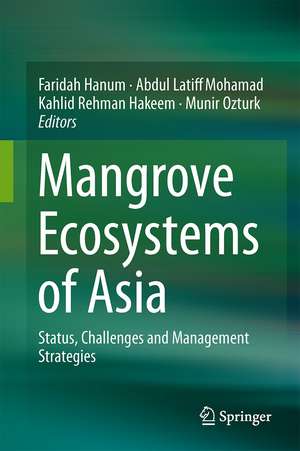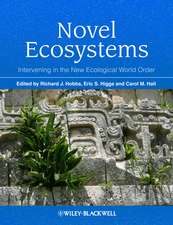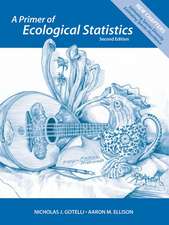Mangrove Ecosystems of Asia: Status, Challenges and Management Strategies
Editat de I. Faridah-Hanum, A. Latiff, Khalid Rehman Hakeem, Munir Ozturken Limba Engleză Hardback – noi 2013
| Toate formatele și edițiile | Preț | Express |
|---|---|---|
| Paperback (1) | 1389.30 lei 6-8 săpt. | |
| Springer – 22 aug 2016 | 1389.30 lei 6-8 săpt. | |
| Hardback (1) | 1395.63 lei 6-8 săpt. | |
| Springer – noi 2013 | 1395.63 lei 6-8 săpt. |
Preț: 1395.63 lei
Preț vechi: 1701.99 lei
-18% Nou
Puncte Express: 2093
Preț estimativ în valută:
267.14€ • 290.27$ • 224.54£
267.14€ • 290.27$ • 224.54£
Carte tipărită la comandă
Livrare economică 21 aprilie-05 mai
Preluare comenzi: 021 569.72.76
Specificații
ISBN-13: 9781461485810
ISBN-10: 1461485819
Pagini: 488
Ilustrații: XVI, 473 p. 148 illus., 133 illus. in color.
Dimensiuni: 155 x 235 x 32 mm
Greutate: 0.86 kg
Ediția:2014
Editura: Springer
Colecția Springer
Locul publicării:New York, NY, United States
ISBN-10: 1461485819
Pagini: 488
Ilustrații: XVI, 473 p. 148 illus., 133 illus. in color.
Dimensiuni: 155 x 235 x 32 mm
Greutate: 0.86 kg
Ediția:2014
Editura: Springer
Colecția Springer
Locul publicării:New York, NY, United States
Public țintă
ResearchCuprins
Chapter 1: Mangrove Ecosystems of Malaysia: Status, Challenges and Management Strategies.- Chapter 2: Distribution and Rarity of Rhizophoraceae in Peninsular Malaysia.- Chapter 3: Distribution and Current Status of Mangrove Forests in Indonesia.- Chapter 4: Mangrove Forests in Thailand.- Chapter 5: Philippines' Mangrove Ecosystem: Status, Threats and Conservation.- Chapter 6: Distribution, Characteristics and Economic Importance of Mangrove Forests in Iran.- Chapter 7: Plant Diversity and Forest Structure of the Three Protected Areas (Wildlife Sanctuaries) of Bangladesh Sundarbans: Current Status and Management Strategies.- Chapter 8: Mangrove Fauna of Asia.- Chapter 9: Mangrove Forests of Timor-Leste: Ecology, Degradation, and Vulnerability to Climate Change.- Chapter 10: Vulnerability of Mangroves to Climate Change.- Chapter 11: Impacts of Climate Change on Asian Mangrove Forests.- Chapter 12: Quantification of Soil Organic Carbon Storage and Turnover in Two Mangrove Forests Using Dual Carbon Isotopic Measurements.- Chapter 13: The Relationship between Mangrove Deforestation and Economic Development in Thailand.- Chapter 14: Remote Sensing Technology: Recent Advancements for Mangrove Ecosystems.- Chapter 15: Management Strategies for Sustainable Exploitation of Aquatic Resources of the Sundarbans Mangrove, Bangladesh.- Chapter 16: Economic Sustainability for Halophyte Cash Farms in Urban Environments.- Chapter 17: Research and Development Activities towards Sustainable Management of Mangroves in Peninsular Malaysia.- Chapter 18: Climate Change Adaptation: Management Options for Mangrove Areas.- Chapter 19: Managing Mangrove Habitat Expansion in New Zealand.- Chapter 20: Mangroves are Wetlands, not Forests: Some Implications for their Management.
Notă biografică
Dr. Ibrahim Faridah-Hanum is a Professor of Forest Botany and Dean of the Faculty of Forestry at Universiti Putra Malaysia. She is the Editor-in-Chief of the 75-year-old journal The Malaysian Forester, editor of the Japanese journal TROPICS, and editor of Pakistan Journal of Botany.
Prof. Emeritus Dato' Dr. Abdul Latiff Mohamad has served as a Professor of Botany at Universiti Kebangsaan Malaysia since 1991 and was appointed Dean of the Faculty of Science and Technology in 2002. He has published more than 450 papers, abstracts, and reports and has edited more than 60 books and proceedings. Prof. Latiff is the Chairman of WWF (Malaysia) and Chairman of Pulau Banding Foundation (Malaysia).
Dr. Khalid Rehman Hakeem is a post doctorate research fellow at Universiti Putra Malaysia. He has edited and authored more than seven books, more than 20 research publications in peer-reviewed journals, and 10 book chapters.
Prof. Munir Ozturk is a Consultant Fellow at the Faculty of Forestry, Universiti Putra Malaysia. He has published more than 400 papers in national and international journals, more than 50 book chapters, and has edited more than 10 books with Springer and Cambridge Scholars.
Prof. Emeritus Dato' Dr. Abdul Latiff Mohamad has served as a Professor of Botany at Universiti Kebangsaan Malaysia since 1991 and was appointed Dean of the Faculty of Science and Technology in 2002. He has published more than 450 papers, abstracts, and reports and has edited more than 60 books and proceedings. Prof. Latiff is the Chairman of WWF (Malaysia) and Chairman of Pulau Banding Foundation (Malaysia).
Dr. Khalid Rehman Hakeem is a post doctorate research fellow at Universiti Putra Malaysia. He has edited and authored more than seven books, more than 20 research publications in peer-reviewed journals, and 10 book chapters.
Prof. Munir Ozturk is a Consultant Fellow at the Faculty of Forestry, Universiti Putra Malaysia. He has published more than 400 papers in national and international journals, more than 50 book chapters, and has edited more than 10 books with Springer and Cambridge Scholars.
Textul de pe ultima copertă
Mangrove ecosystems occur in the inter-tidal region between sea and land in tropical and sub-tropical latitudes and provide important ecosystem goods and services. These forests help stabilize shorelines and reduce the devastating impact of natural disasters such as tsunamis and hurricanes. They serve as breeding and nursing grounds for marine species, and are sources of food, medicine, fuel, and building materials for local communities. However, these ecosystems have been declining at an alarming rate—perhaps even more rapidly than inland tropical forests—and much of what remains is in a degraded condition. Habitat destruction through human encroachment has been the primary cause of mangrove loss. The loss of mangrove habitats has resulted in a decline in fishery resources and biodiversity. This book provides an up-to-date account of mangrove ecosystems in Asia as well as restoration and ecosystem management techniques to ensure the sustainability and conservation of the mangrove. The book is divided into sections presenting the distribution and status of mangrove ecosystems in Asia, the challenges they are facing, the issues and opportunities arising from these challenges, and management strategies for mangrove conservation.
Caracteristici
Provides current critical account of the status of the mangroves of Asia
Provides an overview of mangrove restoration and management techniques
Mangroves are a hot topic and the rate of climate change necessitates new volumes regularly
Includes supplementary material: sn.pub/extras
Provides an overview of mangrove restoration and management techniques
Mangroves are a hot topic and the rate of climate change necessitates new volumes regularly
Includes supplementary material: sn.pub/extras







